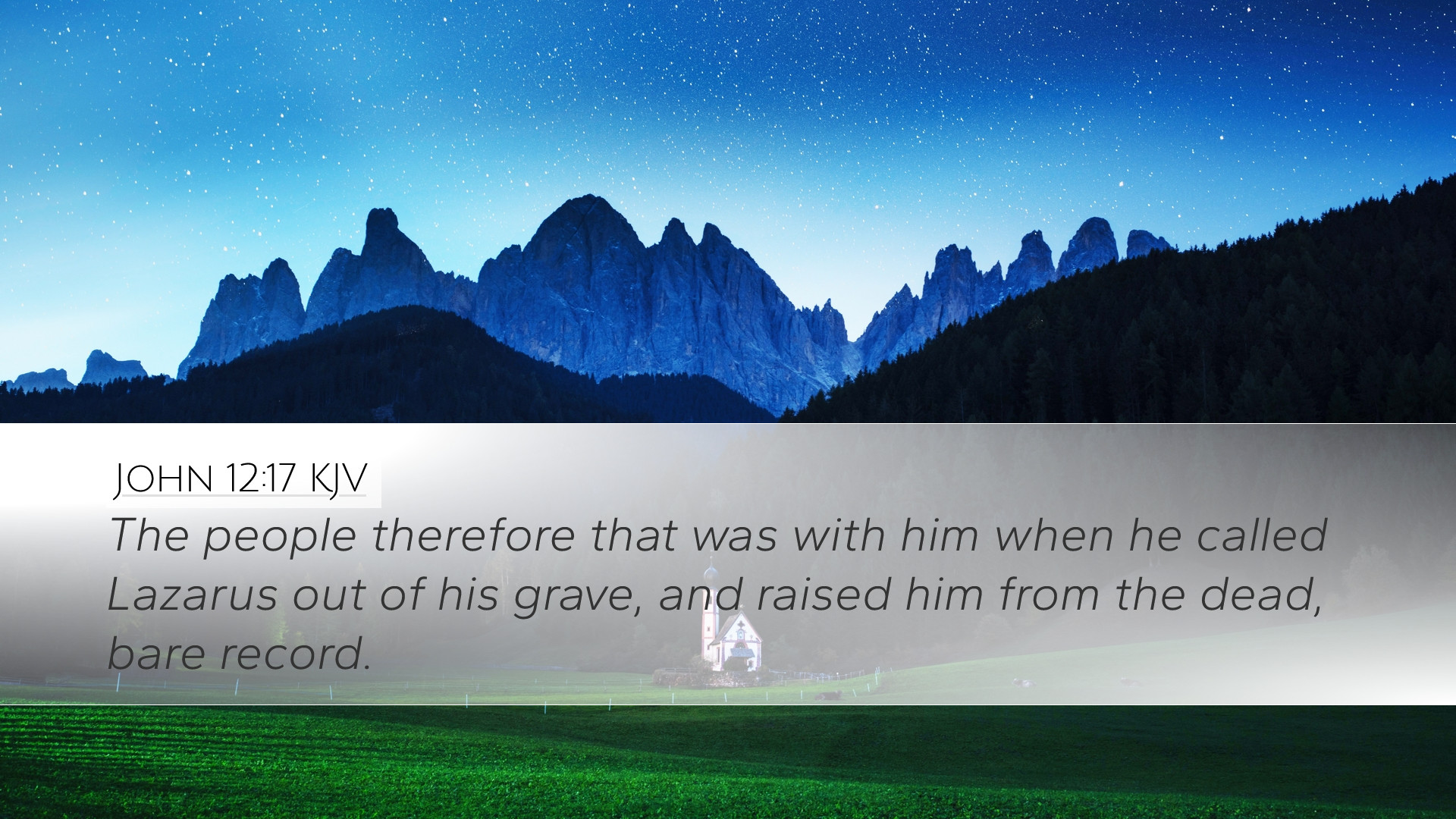Commentary on John 12:17
John 12:17 (ESV): "The crowd that had been with him when he called Lazarus out of the tomb and raised him from the dead continued to bear witness."
Introduction
The events surrounding the triumphal entry of Jesus into Jerusalem are chronicled in the Gospels, with John providing a unique perspective. John 12:17 captures a pivotal moment that underscores the relationship between the crowd's testimony and the miraculous acts of Jesus. This verse highlights the role of witnesses in proclaiming the identity and mission of Christ.
Contextual Background
Prior to this verse, Jesus performed the profound miracle of raising Lazarus from the dead, an act that solidified His authority and divine nature. The crowd that witnessed this miracle now serves as witnesses to Jesus’ ministry. Their continued testimony is critical as it sets the stage for the public’s reception of Jesus in Jerusalem.
Insights from Commentaries
Matthew Henry's Commentary
Matthew Henry emphasizes the importance of the crowd’s testimony. He notes that their witness was not only spontaneous but also rooted in genuine awe over what they had observed. The power to raise Lazarus serves as compelling evidence of Jesus' authority over death, which should encourage believers to bear witness to Christ in their lives.
- Witness as a Theme: Henry points out that the act of bearing witness is a central theme in the Gospel of John, elevating the calling of believers to share their experiences with Christ.
- The Significance of Miracles: The miracles are presented as signs pointing to Jesus’ divine mission and identity, further encouraging the faithful and instilling a sense of urgency in their testimonies.
Albert Barnes' Notes on the Bible
Albert Barnes brings attention to the implications of the crowd's presence and their proclamations. Barnes refers to this moment as pivotal in validating Jesus' character, underscoring it as a response to His miracle-working power. He delineates how the crowd’s testimony fosters a growing enthusiasm that leads to their eventual reception of Jesus as the Messiah.
- Faith and Witness: Barnes argues that the role of witness reflects a deeper faith. The crowd’s testimony is portrayed as an act of faith that mirrors the excitement and recognition of Jesus' miraculous works.
- Public Example: The narrative invites pastors and theologians to reflect on the importance of public witness in their ministries, encouraging the faithful to share their stories of Jesus’ transformative power in their lives.
Adam Clarke's Commentary
Adam Clarke approaches the text with an exploration of the historical and social dynamics at play. He illustrates that the crowd's enthusiasm was fueled not merely by the miracle of Lazarus but also by the political and spiritual expectations surrounding Jesus’ entry into Jerusalem. Clarke emphasizes that their witness is an acknowledgment of Jesus’ authority, which beckons further exploration of the implications of both His miracles and His messages.
- Cultural Context: Clarke emphasizes the cultural expectations of the Jewish people regarding a Messiah during this time, noting how these expectations influenced their witness and actions.
- Spectators and Participants: He encourages a reflection on the difference between being a spectator of miracles and becoming an active participant through faith and testimony, a theme that resonates with modern believers.
Theological Reflections
This verse invites significant theological reflection on the nature of witness in the life of a believer. The crowd's testimony serves as a model for Christians today, who are called to bear witness to Christ in their everyday lives. The act of sharing personal experiences of Jesus' works can be transformational, encouraging others to explore their faith more deeply.
Furthermore, the significance of miracles as divine signs emphasizes the continuity of God’s revelation throughout Scripture. Witnessing Jesus’ authority over life and death is a reminder that His mission involves not merely physical resurrection but also spiritual rebirth, which empowers believers to witness the hope of the Gospel.
Application for Ministry
For pastors, students, and theologians, John 12:17 serves as a powerful reminder of the urgency and importance of witness in ministry. The engagement of the crowd can inspire churches to cultivate environments where testimonies are shared, encouraging growth and strengthening faith.
- Encouraging Testimony: Ministries should develop opportunities for congregants to share their stories which will affirm their faith and encourage others.
- Understanding Cultural Context: Being aware of the cultural and social expectations surrounding Christ today can enhance how the church engages with its community.
- Fostering Spiritual Growth: Emphasizing that every believer is a witness encourages discipleship and spiritual maturity within the church.
Conclusion
John 12:17 encapsulates a moment of profound significance that shines a light on the human response to divine action. The crowd’s ongoing testimony serves as a reminder of the impact of Jesus' ministry and the call to all believers to embody and share their faith. As they reflect on this passage, pastors, students, and scholars are equipped to partake in the ongoing narrative of Christ’s ministry, actively engaging in the essential role of witnesses to the Gospel.


